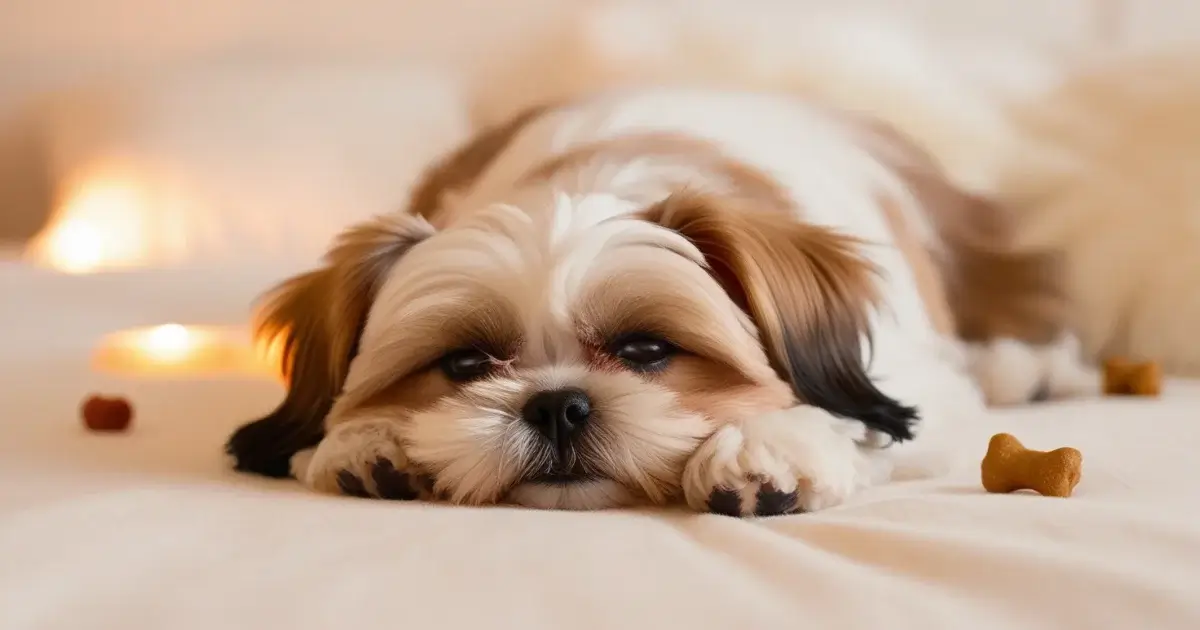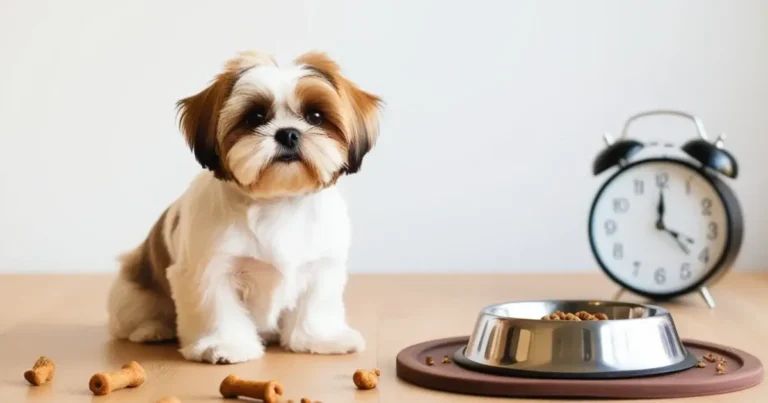Why Shih Tzu Dogs Sleep So Much: Amazing rest habit revealed
Shih Tzus are known for their affectionate nature and charming appearance. But many owners notice one trait that stands out—how much they sleep. Do Shih Tzu dogs sleep a lot? Yes, they do. Understanding their sleep habits can help you ensure they stay healthy and comfortable.
Table of Contents
How Long Does a Shih Tzu Sleep?
Shih Tzus are unique in their sleep needs. Their age determines the hours of rest they require.
Shih Tzu Puppy Sleep Patterns
Newborn Shih Tzus sleep 19 to 22 hours daily. They wake only for brief feeding sessions and then fall back asleep. This routine is essential for their growth.
As they transition to solid food, their sleep needs decrease. Puppies under one year old typically sleep 16 to 20 hours daily. They alternate between bursts of play and naps. This cycle helps them recharge and remain active.

Adult Shih Tzu Sleep Duration
Adult Shih Tzus sleep 12 to 16 hours daily. Their rest includes nighttime sleep and short naps during the day.
| Factor | Impact on Sleep |
| Activity Levels | High activity leads to better nighttime sleep. |
| Owner Interaction | Longer naps occur when left alone often. |
Routine exercise and engagement reduce excessive daytime sleep and ensure quality nighttime rest.
Senior Shih Tzu Sleeping Needs
Senior Shih Tzus sleep 14 to 19 hours daily. Their bodies need more time to recover from daily activities. Joint discomfort or age-related conditions may also lead to irregular sleep schedules. Older dogs often nap more during the day but still sleep well at night.
Why Do Shih Tzus Sleep So Much?
Shih Tzus have specific traits and environmental factors that influence their sleep habits.
Natural Breed Traits
Shih Tzus are brachycephalic, meaning their flat faces can cause mild breathing difficulties. This can lead to quicker fatigue. Their genetic traits also make them prone to longer rest periods. Small breeds often conserve energy by sleeping more.
Environmental and Lifestyle Factors
A Shih Tzu’s surroundings significantly affect their sleep.
- Quiet Environments: Calm spaces encourage extended naps.
- Owner Activity: Active play keeps them awake longer, reducing daytime sleep.
- Loneliness: When left alone, Shih Tzus tend to nap more due to boredom.
Consistent schedules and regular interaction can balance their sleep and activity levels.
Health and Emotional Factors
Some Shih Tzus sleep more due to health or emotional challenges.
- Stress or Anxiety: Emotional distress often results in longer naps.
- Medications: Treatments for illnesses might increase sleepiness.
Monitoring changes in their sleep patterns can help identify any underlying issues.
Shih Tzu Dogs Sleep: Comparing to Other Breeds
Shih Tzus are not the only dogs known for their long sleeping hours. Large breeds, such as Saint Bernards or Greyhounds, also rest extensively. However, Shih Tzus are unique due to their smaller size and brachycephalic traits. They combine periods of playful activity with extended naps, making their sleep patterns distinct.
Ensuring Quality Sleep for Your Shih Tzu
Helping your Shih Tzu sleep better improves their overall health.
Ideal Sleeping Environment
Shih Tzus need a comfortable and safe space to rest.
- Use orthopedic beds to support joints and ease breathing.
- Place the bed in a quiet, dark corner of your home.
- Ensure the room temperature is comfortable.

Diet and Schedule Adjustments
Good nutrition and regular schedules enhance their sleep quality.
| Adjustment | Benefit |
| Balanced Meals | Prevents overeating and promotes sound sleep. |
| Daily Walks | Reduces excess energy for better nighttime rest. |
A fixed routine of meals, exercise, and naps supports healthy sleep habits.
Sleep Training Tips
Training helps Shih Tzus adjust to a proper sleep schedule.
- Establish consistent feeding and bedtime routines.
- Reduce lights and noise one hour before bedtime.
- Provide toys or blankets to encourage self-soothing.
Simple steps like these lead to peaceful and uninterrupted sleep.
When to Worry About Your Shih Tzu’s Sleep
While Shih Tzu dogs sleep a lot, unusual changes in their sleep patterns could signal issues.
Signs of Sleep Disorders
Look out for:
- Loud snoring or breathing difficulties.
- Restlessness during sleep or frequent waking.
- Sudden changes in behavior or activity levels.
Seeking Veterinary Advice
If sleep issues persist, consult your vet. Health problems such as arthritis or cognitive decline in older dogs can interfere with their rest. Addressing these concerns early ensures their comfort and well-being.
Conclusion: Understanding and Supporting Your Shih Tzu’s Sleep Habits
Shih Tzus are naturally sleepy dogs. Their extended rest periods support their health and energy. By providing a comfortable environment, maintaining consistent routines, and addressing potential health concerns, you can ensure your Shih Tzu thrives.
Adequate sleep isn’t just a habit for Shih Tzus—it’s a key part of their happiness and vitality.
FAQs
How can I tell if my Shih Tzu’s sleep patterns are normal?
Observe their activity levels and sleep duration. Shih Tzu puppies sleep 16-20 hours, while adults rest 12-16 hours. If they show drastic changes, consult a vet.
Can diet affect how long Shih Tzu dogs sleep?
Yes, a balanced diet ensures they stay active and sleep well. Overfeeding can lead to lethargy, while an improper diet might disrupt their natural rest cycles.
How long does a Shih Tzu sleep during the night?
Shih Tzus typically sleep 8-9 hours at night, complemented by daytime naps. Consistent schedules and a quiet environment help improve nighttime sleep
What are the best ways to improve my Shih Tzu’s sleep quality?
Provide an orthopedic bed, maintain a fixed routine, and engage them in light exercise daily. Reducing noise and dimming lights before bedtime also supports better rest.







